

Why Compassion in Business Makes Sense, by Emma Seppala. Managers often mistakenly think that putting pressure on employees will increase performance.
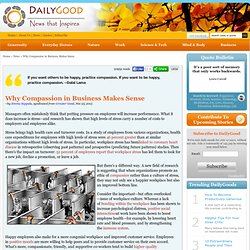
What it does increase is stress—and research has shown that high levels of stress carry a number of costs to employers and employees alike. Stress brings high health care and turnover costs. In a study of employees from various organizations, health care expenditures for employees with high levels of stress were 46 percent greater than at similar organizations without high levels of stress. In particular, workplace stress has beenlinked to coronary heart disease in retrospective (observing past patterns) and prospective (predicting future patterns) studies. Then there’s the impact on turnover: 52 percent of employees report that workplace stress has led them to look for a new job, decline a promotion, or leave a job.
How to Be More than a Mindful Consumer, by Annie Leonard. The life cycle of a simple cotton T-shirt—worldwide, 4 billion are made, sold, and discarded each year—knits together a chain of seemingly intractable problems, from the elusive definition of sustainable agriculture to the greed and classism of fashion marketing.
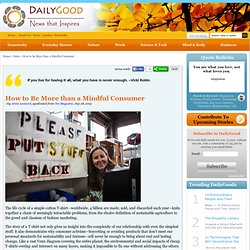
The story of a T-shirt not only gives us insight into the complexity of our relationship with even the simplest stuff; it also demonstrates why consumer activism—boycotting or avoiding products that don’t meet our personal standards for sustainability and fairness—will never be enough to bring about real and lasting change. Like a vast Venn diagram covering the entire planet, the environmental and social impacts of cheap T-shirts overlap and intersect on many layers, making it impossible to fix one without addressing the others. Seth Godin on the Art of Noticing and Creating, by Seth Godin. Krista Tippett, Host: We live in a world that is re-creating itself one life and one digital connection at a time.
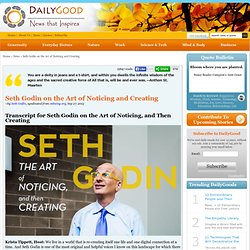
And Seth Godin is one of the most original and helpful voices I know on this landscape for which there are no maps. He was one of the early Internet entrepreneurs and remains a singular thought leader and innovator in what he describes as our post-industrial connection economy. An emerging inquiry into social participation. Alfredo Moser: Bottle light inventor proud to be poor. Alfredo Moser's invention is lighting up the world.
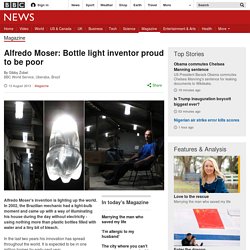
In 2002, the Brazilian mechanic had a light-bulb moment and came up with a way of illuminating his house during the day without electricity - using nothing more than plastic bottles filled with water and a tiny bit of bleach. In the last two years his innovation has spread throughout the world. Bill Ford on Compassion in Business. At the recent Wisdom 2.0 conference, Ford Motor Company Executive Chairman Bill Ford sat down with Jack Kornfield, founding teacher of the Insight Meditation Society and Spirit Rock Meditation Center, to discuss what role compassion, mindfulness and wisdom play in modern business.
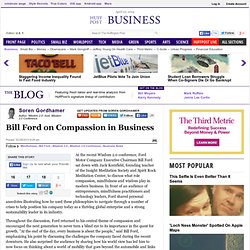
In front of an audience of entrepreneurs, mindfulness practitioners and technology leaders, Ford shared personal anecdotes illustrating how he used these philosophies to navigate through a number of crises to help position his company today as a thriving global enterprise and a strong sustainability leader in its industry. A World Without Landfills? It's Closer Than You Think, by Jen Soriano. Goldman Prize recipient Nohra Padilla at a recycling facility.
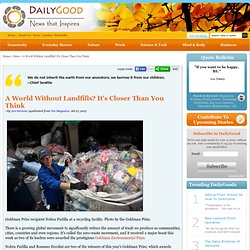
Photo by the Goldman Prize. There is a growing global movement to significantly reduce the amount of trash we produce as communities, cities, countries and even regions. It’s called the zero-waste movement, and it received a major boost this week as two of its leaders were awarded the prestigious Goldman Environmental Prize. Social Banking Discovers the Commons. The idea of “social banking” is a bit of a mind-bender for most Americans accustomed to the cutthroat ways of Wall Street and the alarmingly concentrated banking/finance sector.
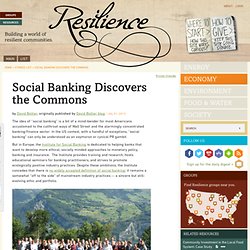
In the US context, with a handful of exceptions, “social banking” can only be understood as an oxymoron or cynical PR gambit. But in Europe, the Institute for Social Banking is dedicated to helping banks that want to develop more ethical, socially minded approaches to monetary policy, banking and insurance. The Institute provides training and research, hosts educational seminars for banking practitioners, and strives to promote ecologically positive industry practices. In Climbing Income Ladder, Location Matters. ATLANTA – Stacey Calvin spends almost as much time commuting to her job — on a bus, two trains and another bus — as she does working part-time at a day care center. She knows exactly where to board the train and which stairwells to use at the stations so that she has the best chance of getting to work on time in the morning and making it home to greet her three children after school. “It’s a science you just have to perfect over time,” said Ms.
Calvin, 37. Her nearly four-hour round-trip stems largely from the economic geography of Atlanta, which is one of America’s most affluent metropolitan areas yet also one of the most physically divided by income. Buy a phone, start a movement. With little or no emphasis on fair trade in mobile technologies at present, Fairphone is working to prove that a reasonably priced, low-carbon-impact smartphone is possible.
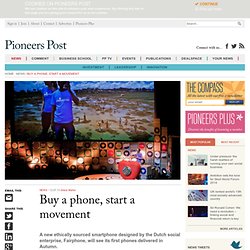
It has a scratchproof dragontrail glass screen, 16GB internal memory, dual front and rear cameras, and a 4.3-inch qHD display, but what makes the Fairphone special is not its technical specs. It may sound like many other smartphones, but behind the allure of its high-performance features is an ethically-minded social enterprise battling with issues from e-waste to poor working conditions in the mobile technology industry.
Research by Oekom suggests that manufacturers of phones are more likely to be in breach of international labour standards than the textiles and foods industries, which are scrutinised far more closely. Fairphone takes a proactive approach to ensuring workers at each stage of the supply chain are treated fairly. The Battle for Sustainable Cities. The Battle for Sustainable Cities Although occupying only 2% of the Earth’s land surface, cities account for more than 60% of global energy consumption and 75% of carbon emissions.
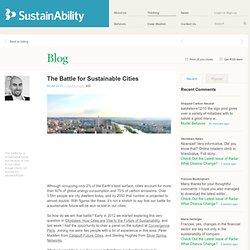
Three Trends Shaping the Future of Food Security. For decades, the Rockefeller Foundation has recognized and addressed the link between food and population, and with the inexorable growth of cities, both in terms of population and land area, our work has taken a sharper focus on the nexus between cities and agriculture.
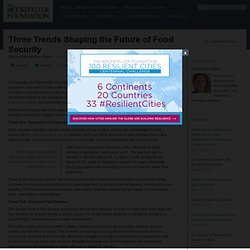
Indeed, we see this intersection as mission-critical to our dual goals of building resilience against the acute shocks and stresses of our 21st century world, and promoting equitable growth. 1 MIN READING: The fisherman and the businessman. Blog. The expression “bottom of the pyramid” was first used by U.S. President Franklin Roosevelt in his 1932 address, The Forgotten Man. Eco Tech 2013 Workshop. Original image source The Guardian SITTING in a crowded room with a figure like Satish Kumar is a strange feeling. Not only is he the Editor in Chief of the excellent Resurgence publication but he is also, as you would probably expect, an inspirational character. Put simply, every word he speaks seems profound and considered, there is no rush to talk or desire not to listen. The Infinite Resource: Ramez Naam.
“By providing a detailed, statistically rich historical background on many of the detrimental practices and attitudes that have brought humanity to the nail-biting precipice that may await a century from now, Naam strengthens his soberly confident, if not cautiously optimistic, predictions for how humans can walk it back from the edge of disaster.” —Booklist. 10 Hypotheses About Abundance and the Commons, by Roberto Verzola. Systemfailure2. A Midwife to the Dying, by Krista Tippett in Conversation with Joan Halifax. The City That Ended Hunger, by Frances Moore Lappé Chaordic interview. Happy to save the planet. Manifesto. Values and sharing economy. We are all painfully familiar with the plethora of statistics that illustrate how unsustainable modern lifestyles have become and how humanity is already consuming natural resources far faster than the planet can produce or renew them. Trust. Door to door strategy for cleaner, greener transport.
Transport Minister Norman Baker has launched the Government’s new Door to door strategy to improve sustainable transport integration and reduce the barriers to the use of sustainable local transport. SD Scene publishes news and comment on sustainable development from across government, business and civil society. Pass the sustainability baton and rebrand it 'sexy' Reducing complex science to simple science in attempts to mobilise mainstream behaviour change has failed to deliver and many brands have the battle scars to prove it. Some 18% are "deep greens" and everyone else is …normal. Welcome to Forbes.